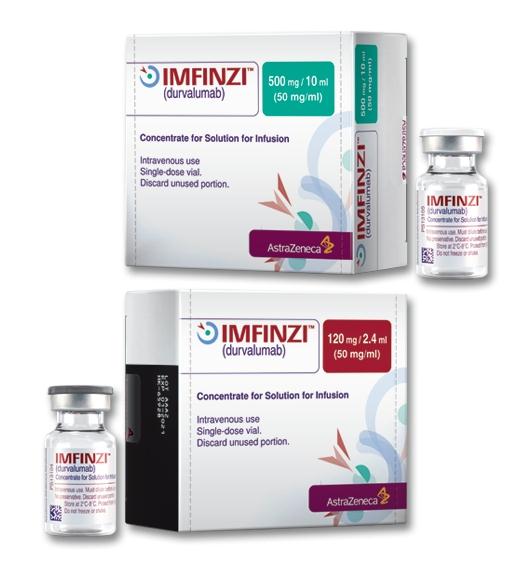US FDA Grants Imfinzi Priority Review For Treatment Of Extensive-Stage Small Cell Lung Cancer
Source: Thailand Medical News Dec 02, 2019 5 years, 4 months, 1 week, 5 days, 18 hours, 53 minutes ago
Pharma Conglomerate,
AstraZeneca announced that the US Food and Drug Administration (FDA) has accepted a supplemental Biologics License Application (sBLA) and granted Priority Review for
Imfinzi (
durvalumab) for the treatment of patients with previously untreated extensive-stage
small cell lung cancer (
SCLC).
 Small Cell Lung Cancer
Small Cell Lung Cancer is an aggressive, fast-growing form of
lung cancer that recurs and progresses rapidly despite initial response to platinum-based chemotherapy.(1) A Prescription Drug User Fee Act date is set for the first quarter of 2020.
Thailand Medical News was told that the FDA’s sBLA was based on positive results from the Phase III
CASPIAN trial published in The Lancet, showing
Imfinzi in combination with standard-of-care (SoC) chemotherapy (etoposide with either cisplatin or carboplatin) demonstrated a statistically significant and clinically meaningful improvement in overall survival (OS) vs. SoC. The risk of death was reduced by 27% (equal to a hazard ratio of 0.73), with median OS of 13.0 months for
Imfinzi plus chemotherapy vs. 10.3 months for SoC. Results showed an estimated 33.9% of patients were alive at 18 months following treatment with
Imfinzi plus chemotherapy vs. 24.7% of patients receiving SoC.
Durvalumab or
Imfinzi is approved in the curative-intent setting of unresectable, Stage III non-small cell lung cancer (NSCLC) after chemoradiation therapy in 54 countries, including the US, Japan and the EU, based on the Phase III PACIFIC trial.
CASPIAN is a randomised, open-label, multi-centre, global, Phase III trial in the 1st-line treatment of patients with extensive-stage
SCLC. The trial compared
Imfinzi in combination with etoposide and either cisplatin or carboplatin chemotherapy, or
Imfinzi, tremelimumab and chemotherapy vs. chemotherapy alone. In the experimental arms, patients were treated with up to four cycles of chemotherapy. In comparison, the control arm allowed up to six cycles of chemotherapy and prophylactic cranial irradiation. The trial will continue to the final analysis of OS for the combination of
Imfinzi, tremelimumab and chemotherapy. The trial is being conducted in more than 200 centres across 23 countries, including the US, Europe, South America, Asia and the Middle East. The primary endpoint is OS.
Lung cancer is the leading cause of cancer death among both men and women and accounts for about one-fifth of all cancer deaths.(2)
Lung cancer is broadly split into NSCLC and
SCLC, with about 15% classified as
SCLC.(3) About three quarters of
SCLC patients are diagnosed with extensive-stage disease, in which the cancer has spread widely through the lung or to other parts of the body. Prognosis is particularly poor, as only 6% of all
SCLC patients will be alive five years after diagnosis.(4)
<
;strong>Imfinzi
(durvalumab) is a human monoclonal antibody that binds to PD-L1 and blocks the interaction of PD-L1 with PD-1 and CD80, countering the tumour's immune-evading tactics and releasing the inhibition of immune responses.
Imfinzi is also approved for previously treated patients with advanced bladder cancer in 11 countries, including the US.
As part of a broad development programme,
Imfinzi is also being tested as a monotherapy and in combination with tremelimumab, an anti-CTLA4 monoclonal antibody and potential new medicine, as a treatment for patients with NSCLC,
SCLC, bladder cancer, head and neck cancer, liver
cancer, biliary tract cancer, cervical cancer and other solid tumours.
References:
1.Kalemkerian GP, et al. Treatment Options for Relapsed Small-Cell Lung Cancer: What Progress Have We Made? Journal of Oncology Practice, volume 14, issue no. 6 (June 1, 2018) 369-370.
2.World Health Organization. International Agency for Research on Cancer. Available at https://globocan.iarc.fr/Pages/fact_sheets_population.aspx Accessed November 2019.
3. LUNGevity Foundation. Types of Lung Cancer. Available at https://lungevity.org/for-patients-caregivers/lung-cancer-101/types-of-lung-cancer Accessed November 2019.
4. Cancer.Net. Lung Cancer - Small Cell. Available at https://www.cancer.net/cancer-types/33776/view-all Accessed November 2019.
5.Szumera-Ciećkiewicz A, et al. EGFR Mutation Testing on Cytological and Histological Samples in Non-Small Cell Lung Cancer: a Polish, Single Institution Study and Systematic Review of European Incidence. Int J Clin Exp Pathol. 2013:6;2800-12.
6.Keedy VL, et al. American Society of Clinical Oncology Provisional Clinical Opinion: Epidermal Growth Factor Receptor (EGFR) Mutation Testing for Patients with Advanced Non-Small-Cell Lung Cancer Considering First-Line EGFR Tyrosine Kinase Inhibitor Therapy. J Clin Oncol. 2011:29;2121-27.
7.Ellison G, et al. EGFR Mutation Testing in Lung Cancer: a Review of Available Methods and Their Use for Analysis of Tumour Tissue and Cytology Samples. J Clin Pathol. 2013:66;79-89.
8.Pakkala, S, et al. Personalized therapy for lung cancer: striking a moving target. JCI Insight. 2018;3(15):e120858. 